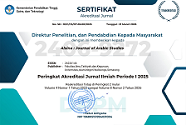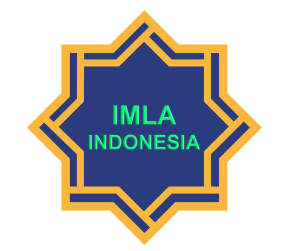Pembelajaran Keterampilan Berbicara dan Langkah-langkah Penyajian Dialog di Universitas Zainul Hasan Probolinggo
DOI:
https://doi.org/10.21580/alsina.3.1.10881Keywords:
Learning Speaking Skills, Learning Activities, Learning Steps of the DialogueAbstract
It is critical to developing speaking abilities while learning Arabic. The purpose of this article is to discuss several activities used to help students improve their speaking abilities at Zainul Hasan University, Probolinggo, Indonesia. The data were gathered via observation and interviews. The findings indicated that Zainul Hasan University students developed their speaking skills using a variety of activities, including memorization and dialogue practice, encouragement to speak, developing speaking Arabic habits, dialogue methods, and feedback on speaking errors. The dialogue method was proposed to develop Zainul Hasan University Probolinggo students' speaking abilities. It was arranged in the following steps: preliminary questions and answers, introduction of new vocabulary, comprehending new vocabulary, listening to the conversation while looking at the text, listening to dialogue without looking at the text, repetition of the dialogue's pronunciation, and in pair dialogue practice.Downloads
References
Aḥmad, ʿAlī Sayyid. Al-Taʿlīm Wa-Al-Muʿallimūn. Aleppo: Dār al-Ṣābūnī, 1997.
Al-Dālīmī, Ṭāhā ʿAlī Ḥusayn, and Suʿād ʿAbd al-Karīm ʿAbbās Al-Wā’ilī. Al-Lughah Al-ʿArabīyah Manāhijuhā Wa-Ṭarā’iq Tadrīsihā. Baghdad: Al-Shurūq, 2005.
Al-Fawzān, ʿAbd al-Raḥmān bin Ibrāhīm. Iḍā’āt Li-Muʿallimī Al-Lughah Al-ʿArabīyah Li-Ghayr Al-Nāṭiqīn Bihā. Riyadh: Fahrasat Maktabat al-Malik Fahd al-Waṭanīyah Athnā’ al-Nashr, 2011.
Al-Rāfiʿī, Muṣṭafá Ṣādiq. Tārīkh Adāb Al-ʿArab. 5th ed. Beirut: Dār al-Kitāb al-ʿArabī, 1999.
Al-Samān, Muḥammad ʿAlī. Al-Tawjīh Fī Tadrīs Al-Lughah Al-ʿArabīyah. Cairo: Dār al-Maʿārif, 1983.
Al-Ṣūfī, ʿAbd al-Laṭīf. Maṣādir Al-Lughah Fi Al-Maktabah Al-ʿArabīyah. ʿAyn Malīlah: Dār al-Hudá, 1992.
Al-Zayyāt, Aḥmad Ḥasan. Tārīkh Al-Adāb Al-ʿArabī. Beirut: Dār al-Maʿrifah, 1993.
Al-ʿAzīz, Sāliḥ ʿAbd, and ʿAbd al-ʿAzīz ʿAbd Al-Majīd. Al-Tarbīyah Wa-Ṭuruq Al-Tadrīs. Mecca: Dār al-Maʿārif, 1976.
Azies, Furqanul, and Chaedar Alwasilah. Pengajaran Bahasa Komunikatif. Bandung: PT. Remaja Rosdakarya, 2000.
Baroroh, R. Umi, and Syindi Oktaviani R Tolinggi. “Arabic Learning Base On A Communicative Approach In Non-Pesantren School.” Ijaz Arabi Journal of Arabic Learning 3, no. 1 (2020). https://doi.org/10.18860/ijazarabi.v3i1.8387.
Fuadi, Farhan. “Implementasi Pendekatan Komunikatif Dalam Pembelajaran Bahasa Arab.” In Multaqa Nasional Bahasa Arab (MUNASBA) Ke-1, Vol. 1, 2018. https://www.munasbauai.com/index.php/mnba/ article/view/28/7.
Ghazali, Syukur. Pembelajaran Keterampilan Berbahasa. Bandung: Refika Aditama, 2010.
Hamid, M. Abdul, and Siti Fatimah. “Development of Arabic Conversation Material Based on Communicative-Interactive Approach.” Ijaz Arabi Journal of Arabic Learning 3, no. 1 (2020). https://doi.org/10.18860/ijazarabi.v3i1.8174.
Ibn Jinnī, Abū al-Fatḥ ʿUthmān. Al-Khaṣā’iṣ. Cairo: Maṭbaʿat al-Hilāl, 1913.
Qāsim, Riyāḍ. Ittijāhāt Al-Baḥth Al-Lughawī Al-Ḥadīth Fi Al-ʿĀlam Al-ʿArabī. Beirut: Mu’assasat Naufal, 1982.
Rahmawati, Eka Dewi. “Pendekatan Komunikatif Dalam Tes Kemampuan Berbicara Bahasa Arab.” Lugawiyyat 3, no. 1 (2021): 59–77. https://doi.org/10.18860/lg.v3i1.12321.
Shaḥḥātah, Ḥasan. Taʿlīm Al-Lughah Al-ʿArabīyah Bayna Al-Naẓarīyah Wa-Al-Taṭbīq. Cairo: Al-Maktabah al-Miṣrīyah al-Lubnānīyah, 2008.
Ṭuʿaymah, Rushdī Aḥmad. Taʿlīm Al-ʿArabīyah Li-Ghayr Al-Nāṭiqīn Bihā: Manāhijuhū Wa-Asālībuhū. Rabat: ICESCO, 1989.
Ulyān, Aḥmad Fu’ād. Al-Mahārāt Al-Lughawīyah: Māhīyatuhā Wa-Ṭarā’iq Tadrīsihā. Riyadh: Dār al-Salām, 1992.
Yūnus, Fatḥī ʿAlī, Maḥmūd Kāmil Al-Nāqah, and Rushdī Aḥmad Ṭuʿaymah. Taʿlīm Al-Lughah Al-ʿArabīyah: Ususuhu Wa-Ijrā’ātuhu. Cairo: Shirkat ʿĀmir li-al-Ṭibāʿah, 1995.
Downloads
Published
How to Cite
Issue
Section
License
Copyright
The copyright of the received article shall be assigned to the publisher of the journal. The intended copyright includes the right to publish the article in various forms (including reprints). The journal maintains the publishing rights to published articles. Authors are allowed to use their articles for any legal purposes deemed necessary without written permission from the journal, but with an acknowledgment to this journal of initial publication.
Licensing
In order for Alsina: Journal of Arabic Studies to publish and distribute research articles, the editors need publishing rights (transferred from author to publisher). This agreement relates to the transfer/publishing copyright license to Alsina: Journal of Arabic Studies but the authors still have significant rights to use and share their published articles.
Alsina: Journal of Arabic Studies supports the need for writers to share, disseminate and maximize the impact of their research and their rights on any database. As a journal article writer, you have the right to various uses of your articles, including that by the institution or company where you work. Copyright can be used without the need for special permission. Authors who publish articles in the Alsina: Journal of Arabic Studies have broad rights to use their work for teaching and scientific purposes without requesting permission, including:
- Use by the author for lectures, presentations, or conferences, with distribution of copies to participants;
- Distribution to colleagues for research use;
- Use in compilations of the author's subsequent work;
- inclusion in a thesis or dissertation;
- Reuse of sections or excerpts from articles in other works (with full acknowledgment of the final article);
- Preparation of derivative works (other than commercial purposes) (with full acknowledgment of the final article);
- Voluntary posting on open websites operated by authors’ or writers' agencies for scientific purposes
When submitting a manuscript, authors do so on the understanding that if accepted for publication, the copyright for publishing (publishing right) of the article shall be assigned/transferred to Alsina: Journal of Arabic Studies.
Authors whose articles are accepted for publication will receive confirmation via email and sent a Copyright Transfer Agreement.


 Accreditation
Accreditation 
 In Collaboration with
In Collaboration with 

 Visitors
Visitors  Article Template
Article Template





